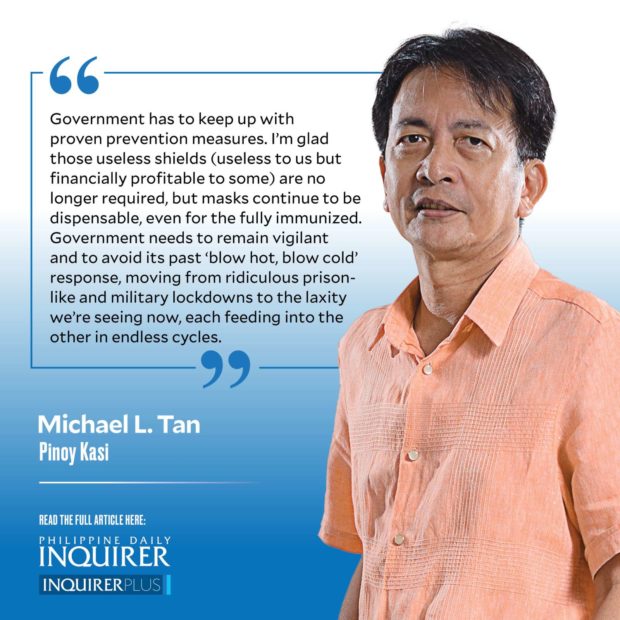Next year is going to be a watershed for the Philippines with national and local elections, but making the year even more crucial is COVID-19 which, for now, seems to be coming under control.
Over the weekend I was swinging from one mood to another, almost euphoric to see especially young people (including my own children) and seniors coming out full force with the easing of restrictions, and seeing businesses picking up again.
But I would do a reality check and worry that we might become too complacent. My children’s COVID vaccinations are still coming up and so we don’t go to large malls, which always turn everyone into cranky zombies anyway, after a short while. In the smaller malls, I still remind them of the Japanese sanmitsu or 3Cs to avoid: crowds, enclosed spaces with poor or no ventilation, and close distances between people.
My anti-COVID assistant has been my dachshund, who used to be a mall rat but now dislikes crowds after a year and a half of quarantine with the kids. Having her around also means the kids don’t just rush into any establishment or crowd.
The next few weeks, especially the height of the holidays in December, will be a test of government’s ability to continue fighting COVID-19 on all fronts. The vaccinations have to remain top priority, with only about a third of the population being fully immunized, even as we move to cover children, and to provide boosters for those already vaccinated.
Government has to keep up with proven prevention measures. I’m glad those useless shields (useless to us but financially profitable to some) are no longer required, but masks continue to be dispensable, even for the fully immunized.
Schools and workplaces need more guidance and support for face-to-face situations. This means creating “bubbles” or “pods” of fully vaccinated people, with access to periodic rapid antigen testing. Most important though is to “inoculate” us against “prevention fatigue” with repeated reminders and updates about COVID-19.
Government needs to remain vigilant and to avoid its past “blow hot, blow cold” response, moving from ridiculous prison-like and military lockdowns to the laxity we’re seeing now, each feeding into the other in endless cycles.
The useless and unproven have to go, from shields to foot “stomping pads,” necklace purifiers … and plastic dividers. We need consistency; government took away the dividers requirement from jeepneys but hapless public schoolteachers have been wasting time, ordered to put up dividers around each school desk. The problem with these measures is that they detract from the methods that do work: masks and physical distancing.
Let’s not deceive ourselves about a “new normal.” It’s become clear that COVID-19 will lurk around longer than we first thought. In the Philippines, health authorities and institutions have not come to terms with long COVID, referring to the persistence of many signs and symptoms, from heart disease to chronic fatigue and fog, months after supposed recovery from COVID.
Let’s look too at the bigger historical context. In 2009, three American public health experts, including Anthony Fauci, published an article in the New England Journal of Medicine reminding people that the 1918 influenza virus never really disappeared. We live now, they continued, in a “century-long, multi-wave pandemic,” the 1918 influenza virus strains’ descendants keep re-emerging, killing thousands each year. The three physicians describe a world that has been involved in an “elaborate dance” with the same partners (humans and the 1918 influenza virus strains), each trying to take the lead. Our annual flu vaccines have been our weapons against these 1918 flu strains taking the lead in a Dance of Death.
Who would have known that on top of the continuing flu pandemic, we would have to deal with coronaviruses, with COVID-19 being the latest and deadliest.
All these pandemics, and epidemics (localized outbreaks of diseases) point to one need: strong public health systems where people are ready to respond rapidly to prevent further spread, to diagnose, test, treat, to develop and administer vaccines.
Also crucial for such a prepared public health system would be social safety nets: unemployment insurance, which is still nonexistent in the Philippines, and universal health care (read: an overhaul of the PhilHealth system).
The link to next year’s elections? Where do our candidates stand, especially those running for national positions, when it comes to comprehensive public health, for the pandemics that lingered on from the past, for the pandemic we fight today, and for pandemics yet to come?
